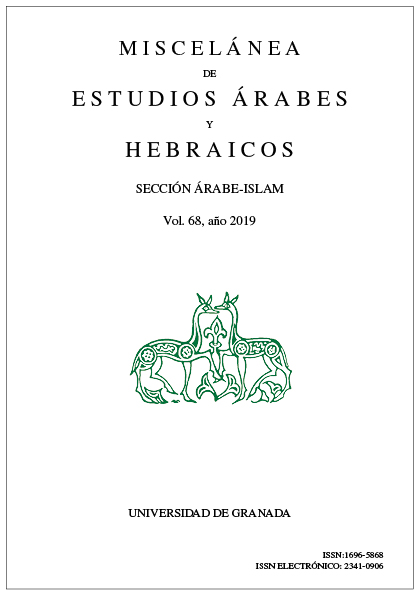Al-Sumaysir, poeta satírico testigo de las Taifas
DOI:
https://doi.org/10.30827/meaharabe.v68i0.982Palabras clave:
al-Sumaysir, Poesía, Sátira, Reinos de taifas, Beréberes, Al-AndalusResumen
Se estudia la vida y la obra del poeta de origen granadino, emigrado a Almería, Abū l-Qāsim Jalaf b. Faraŷ al-Ilbīrī, conocido por el apodo peyorativo de al-Sumaysir. A través de sus versos y de las anécdotas que nos han llegado sobre él en las fuentes árabes, así como teniendo en cuenta los diversos estudios que se le han dedicado, el trabajo se acerca a su compleja trayectoria personal y a su particular visión revolucionaria de su época, el s. XI. Se aportan novedosos datos sobre su personalidad y los motivos de su exilio de Granada, al igual que sobre su vida en la corte del rey al-Mu‘taṣim de Almería. La ironía y crítica de al-Sumaysir alcanzaron a los régulos de taifas y, especialmente, a los beréberes. Es autor también de poemas de tono sentencioso, elegiaco, filosófico y ascético, junto con otros más mundanos, entre ellos atrevidos versos amorosos de inspiración homoerótica. Su poesía, aparentemente grosera, jocosa y festiva, arremete contra diversos aspectos repro- bables de la sociedad andalusí de su tiempo. Es un documento sobre su entorno sociopolítico y cultural.
Descargas
Descargas
Publicado
Cómo citar
Número
Sección
Licencia
Los autores que publican en esta revista están de acuerdo con los siguientes términos:
1. Los autores conservan los derechos de autor y garantizan a la revista el derecho de ser la primera publicación del trabajo al igual que licenciado bajo una Creative Commons Attribution License que permite a otros compartir el trabajo con un reconocimiento de la autoría del trabajo y la publicación inicial en esta revista.
2. Los autores pueden establecer por separado acuerdos adicionales para la distribución no exclusiva de la versión de la obra publicada en la revista (por ejemplo, situarlo en un repositorio institucional o publicarlo en un libro), con un reconocimiento de su publicación inicial en esta revista.
3. Se permite y se anima a los autores a difundir electrónicamente (por ejemplo, en repositorios institucionales o en su propio sitio web) la versión publicada de sus trabajos (versión post-print del editor) o, en su defecto, el de la versión post-print del autor ya evaluada y aceptada. Esto puede dar lugar a intercambios productivos, así como a una citación más temprana y mayor de los trabajos publicados (Véase The Effect of Open Access).
4. La revista no se hace responsable de las opiniones vertidas por los autores.















